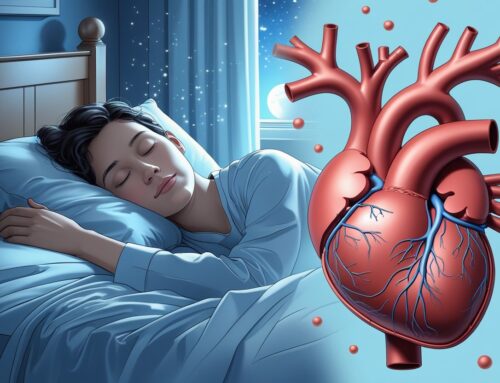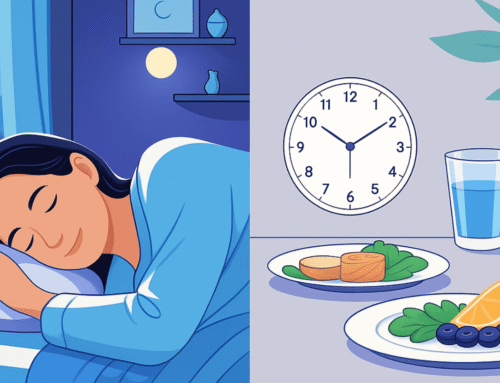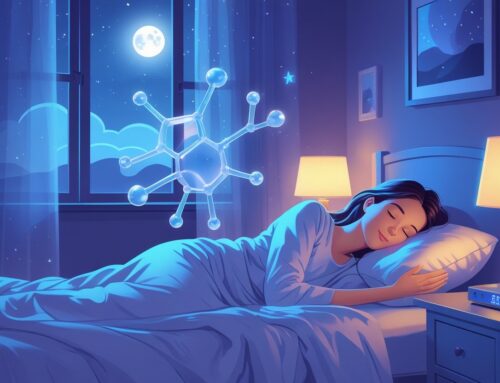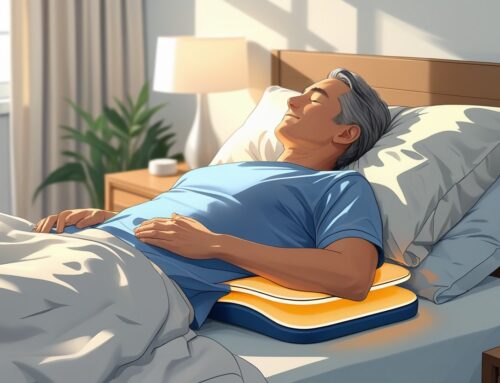Staying up all night and sleeping during the day can quickly alter the levels of various proteins in the blood, which impacts how the body functions. This disruption can disrupt the body’s natural clock, which can lead to issues with mood, focus, and overall health. Even a few days of this schedule can affect the body’s normal rhythms and lead to negative changes.
Daytime sleep differs from nighttime sleep in terms of quality. It tends to be less restorative, meaning the brain and body may not get the full rest they require. Over time, this pattern can increase the risk of conditions like high blood pressure, depression, and diabetes.
For those who must stay awake at night or sleep during the day, adopting certain strategies can help the body adjust. Creating an optimal sleep environment and maintaining a consistent routine are essential to minimizing health risks and improving the quality of daytime sleep.
Key Takeaways
- Disrupting the natural sleep cycle impacts many bodily processes.
- Daytime sleep is generally less restful than nighttime sleep.
- Consistent routines and good sleep habits can help manage inverted sleep patterns.
- A quality mattress aids in adjusting sleep patterns by providing comfort, proper spine support, and temperature control.

Understanding Circadian Rhythms
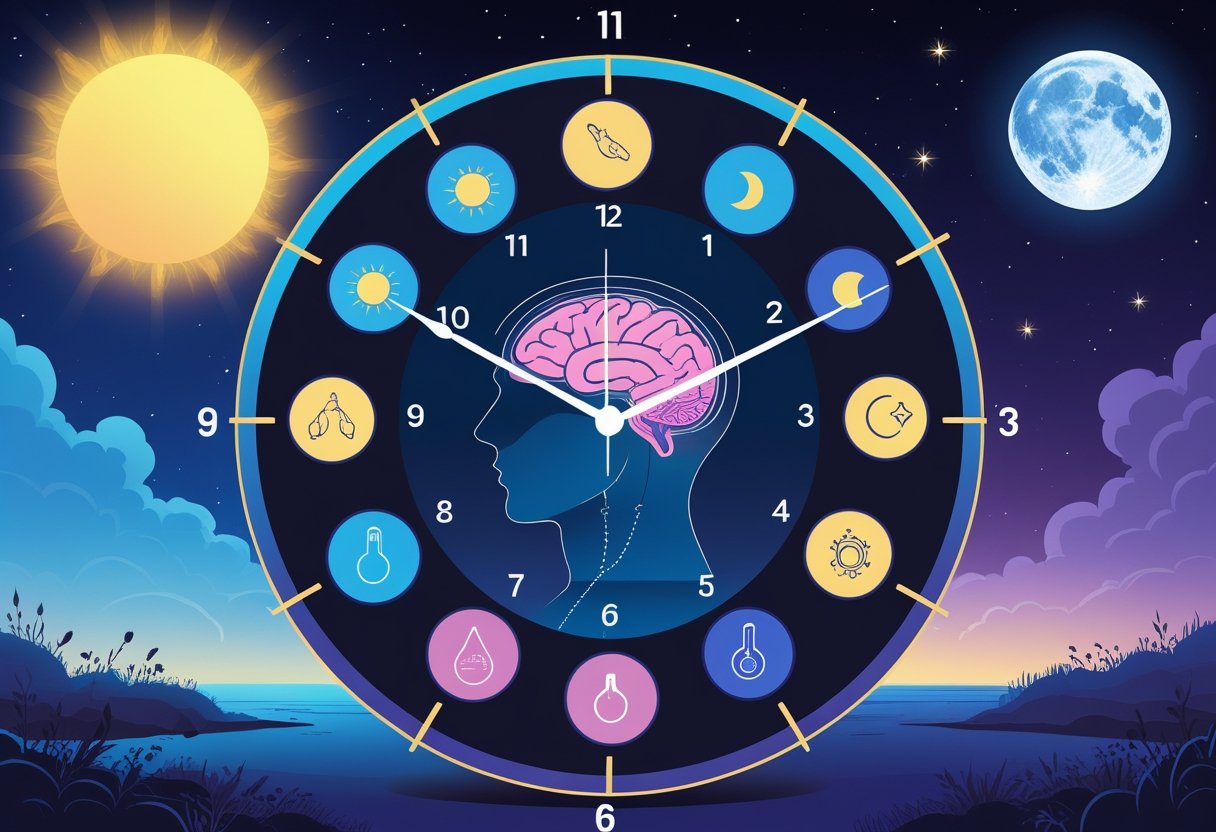
The body’s internal clock is known as the circadian rhythm. It operates on a roughly 24-hour cycle, signaling when to sleep and when to be awake. Light exposure serves as the main cue that keeps this clock aligned with day and night. This clock controls hormone release, body temperature, and metabolism. For example, the body releases melatonin at night, which makes a person feel sleepy. During the day, light lowers melatonin levels, helping a person stay alert.
Sleeping at night aligns better with this natural rhythm than sleeping during the day. Nighttime sleep is deeper and more restorative because the body is designed to repair and recharge when it is dark outside.
Circadian Disruption from Staying Up All Night
When someone stays up all night and sleeps during the day, the body’s internal clock becomes confused. This condition is called circadian disruption. It can result in poor sleep quality, tiredness, and difficulty concentrating. Disrupting the rhythm increases the risk of health problems, such as weight gain, heart disease, and diabetes. This happens because the body’s systems fall out of sync and don’t function properly.
Light exposure at night, such as from screens, further slows melatonin release. This makes it harder to fall asleep and reduces the benefits of sleep taken during the day. Repairing this disruption often requires returning to a consistent night sleep schedule.
Immediate Effects of Staying Up All Night

Staying up all night can quickly change how the body and mind function. These changes include issues with thinking, mood shifts, and physical signs such as tiredness and changes in the body’s balance.
Cognitive and Emotional Impact
When someone stays up all night, their brain struggles to perform well. They may have trouble focusing or remembering things. Tasks requiring clear thinking become more difficult. Reaction times slow, making activities like driving more dangerous. Emotions also shift. People often feel more stressed or anxious. Mood swings become common, and minor problems may seem amplified. Sleep deprivation makes it harder to manage emotions, leading to irritability or frustration.
These effects can appear after just one night of poor sleep and worsen if the pattern continues. Mental performance declines noticeably, which is why “what happens if you stay up all night” involves real risks for daily functioning.
Physical Reactions You May Notice
Physically, staying up all night impacts the body. Fatigue is the most obvious sign, leading to heavy eyelids and frequent yawning. Coordination and balance may decline, increasing the risk of falls or accidents.
The body’s internal clock can get disrupted, which affects hormone levels and metabolism. Blood tests show changes in over 100 proteins, potentially impacting immune function and overall health. Other symptoms include headaches, dry mouth, and muscle weakness. The skin may appear paler or duller without rest. These physical reactions demonstrate what happens when you stay up all night, and they can affect daily life in several ways.
Daytime Sleep Versus Nighttime Sleep
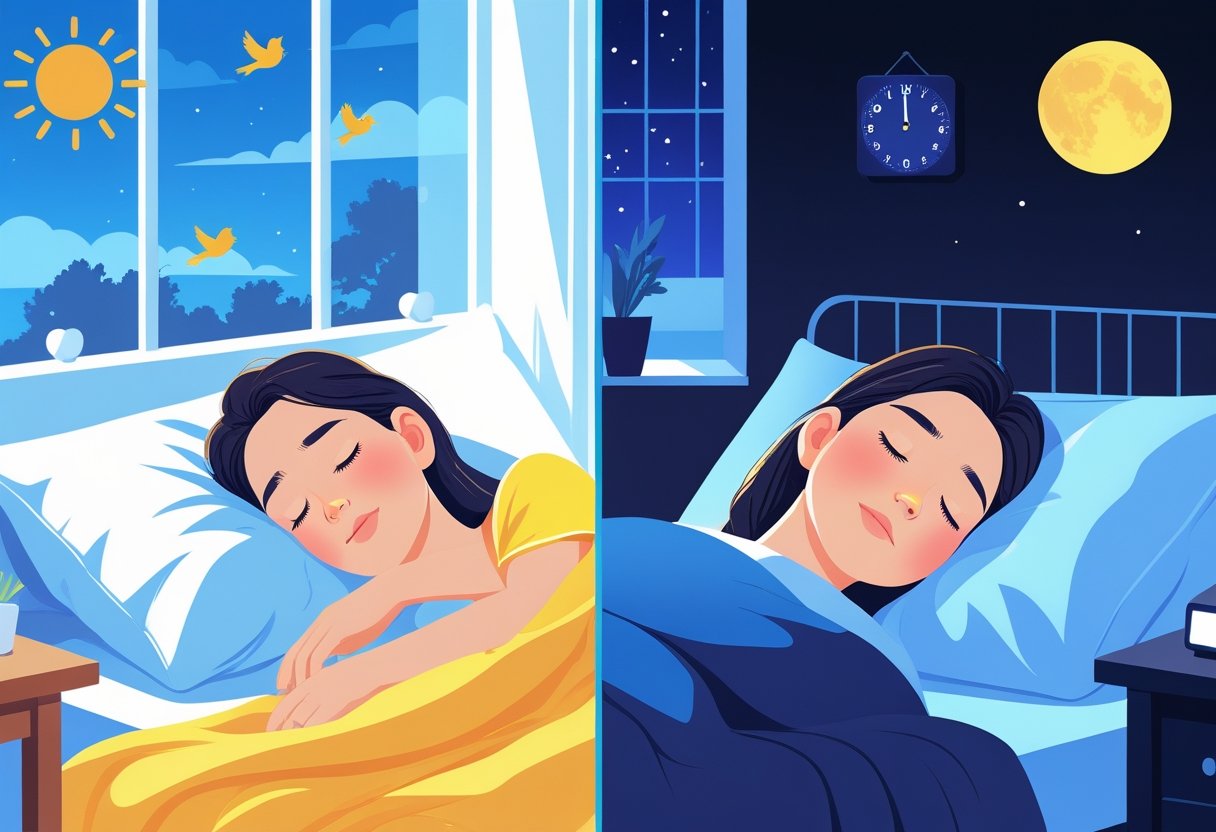
Sleeping during the day instead of at night changes how the body rests and recovers. The timing of sleep affects its quality as well as the body’s hormone balance, which in turn can raise health risks.
Differences in Sleep Quality
Nighttime sleep typically allows for deeper and more restorative stages of rest because of the body’s internal clock, known as the circadian rhythm. In contrast, sleep during the day tends to be lighter and shorter due to natural light exposure and environmental noise. Those who sleep during daylight hours often struggle to reach REM sleep, a critical phase for memory and learning. Less darkness and more interruptions prevent daytime sleep from matching the quality of nighttime rest.
A dark, quiet environment may help, yet daytime sleepers still tend to experience greater fatigue and reduced alertness. This decline can affect both concentration and reaction time. Lower sleep quality also results in tiredness and poor focus, which disrupts daily performance.
Hormonal Effects and Health Risks
Nighttime sleep supports the regulation of hormones such as melatonin, which controls sleep cycles, and cortisol, which manages stress. Sleeping during the day throws off this rhythm, causing melatonin levels to drop while cortisol remains elevated longer than usual. This hormonal imbalance raises stress levels and weakens the immune system. Over time, it may cause irritability, memory issues, and an increased risk of heart disease or diabetes.
Limited daylight exposure also lowers vitamin D production, which impacts mood and bone health. In addition, shifting sleep schedules can disrupt appetite hormones, making weight gain more likely.
Long-Term Consequences of Inverted Sleep Patterns
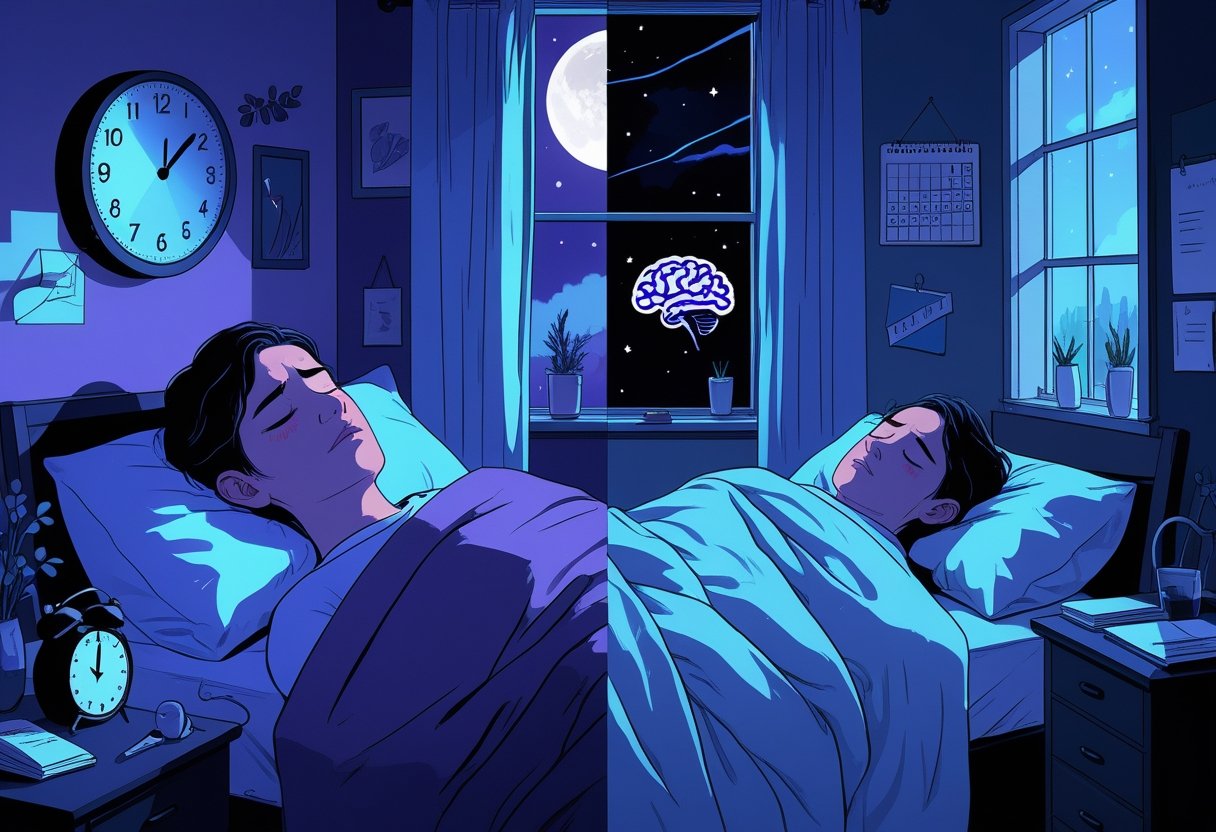
Staying up all night and sleeping all day alters how the body functions. This reversal can trigger serious issues with both physical health and mental well-being. It may also lead to chronic sleep disturbances that damage daily performance and long-term health.
Impact on Physical Health
Sleeping during the day instead of at night affects the body’s internal clock, or circadian rhythm. As a result, hormone levels shift and may contribute to weight gain and poor glucose regulation. People who follow an inverted sleep schedule face a higher risk of heart disease and diabetes.
The body repairs itself most effectively during nighttime sleep. Missing that window weakens the immune system and disrupts essential biological processes. Each night of delayed sleep adds to a growing “sleep debt,” which heightens the risk of severe health issues such as stroke.
Risks to Mental Well-being
Inverted sleep patterns strain mood and mental health. When sleep and wake cycles fall out of sync with daylight, this often leads to irritability, anxiety, and depression.
Disrupted sleep timing interferes with brain function. Concentration, memory, and emotional stability suffer as a result. Extended periods of poor sleep can increase the likelihood of developing personality disorders or other mental health conditions. Daytime sleep tends to be lighter and less restorative, which worsens these effects.
Potential for Sleep Disorders
Flipping the sleep schedule may result in serious sleep disorders. Circadian rhythm disorder is a common outcome; the body’s internal clock no longer aligns with the natural day-night cycle, which makes it hard to fall asleep or stay awake at the right times.
Shift work sleep disorder poses another risk. It causes persistent drowsiness during waking hours and lowers sleep quality, even when total sleep time appears adequate.
Poor sleep quality also disrupts glucose levels and hormone balance, further affecting health even if the amount of sleep remains the same. Sleeping at the wrong time creates obstacles for developing healthy sleep habits and often causes long-term harm.
Common Reasons for Staying Up All Night
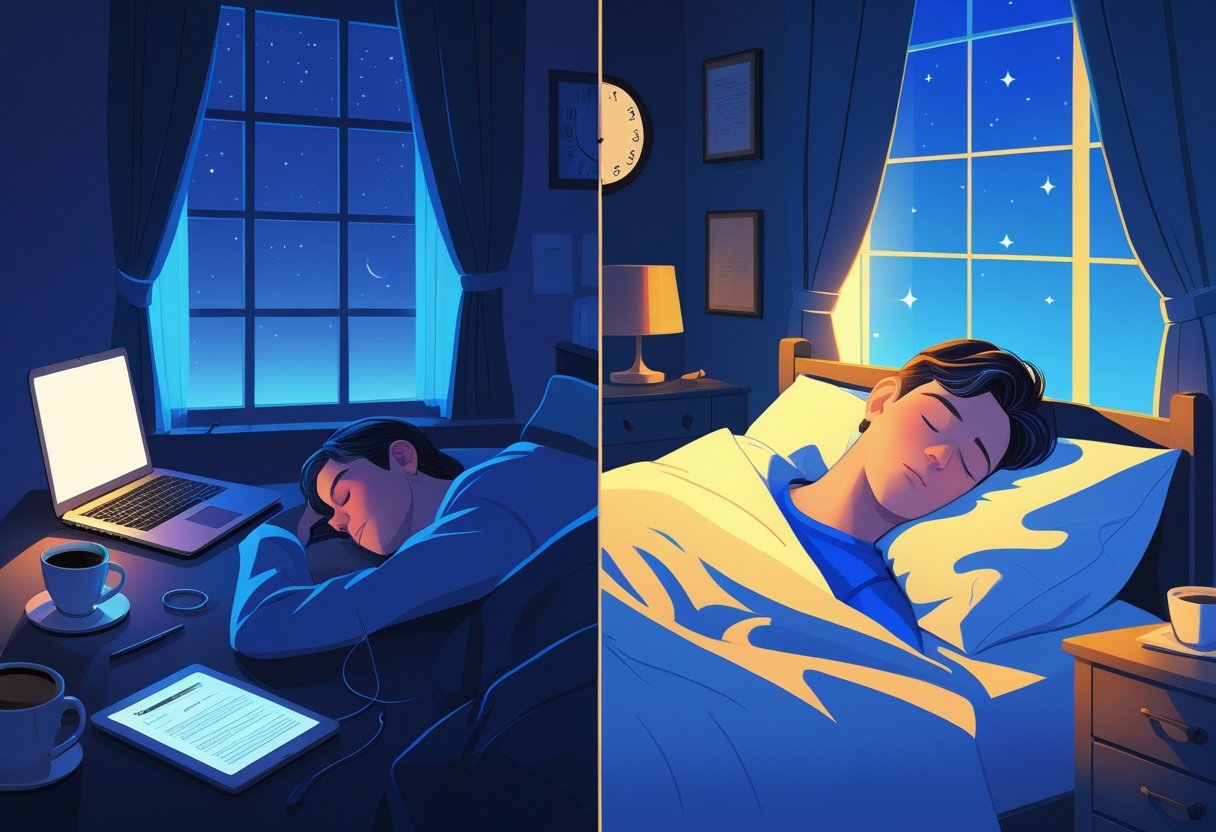
People stay up all night for different reasons. Some choose to stay awake, while others have no control over it. Work schedules and personal habits also play a big role. These factors can affect how the body reacts to sleeping all day instead of at night.
Voluntary Versus Involuntary Sleep Deprivation
Voluntary sleep deprivation happens when someone chooses to stay awake through the night. This can occur due to social activities, entertainment, or work deadlines. People often underestimate the negative effects, such as poor focus and slower reaction times.
Involuntary sleep deprivation occurs when a person cannot sleep at night because of health issues or stress. Conditions like anxiety or insomnia make it hard to fall asleep, leading to daytime sleepiness. Whether voluntary or not, staying up all night disrupts the body’s natural clock.
Shift Work and Lifestyle Choices
Shift work forces many people to stay awake at night and sleep during the day. This schedule conflicts with the body’s natural rhythm, causing fatigue and sometimes serious health problems. People working night shifts often experience trouble staying alert and suffer from longer-term issues like weight gain or heart problems.
Lifestyle choices like gaming, late-night studying, or using screens can also keep people awake. Sleeping all day might seem like a way to catch up, but it often deepens the sleep cycle problems and leads to ongoing tiredness. These habits increase the risk of negative effects seen when people don’t follow normal sleep patterns.
Strategies to Restore a Healthy Sleep Schedule
Resetting your sleep schedule requires deliberate changes to sleep timing and strategies that make daytime sleep more effective. These steps help realign the body’s internal clock and improve rest overall.
Gradually Readjusting Your Sleep Cycle
The most effective way to repair a disrupted sleep cycle involves shifting sleep and wake times in small increments. Adjust bedtime and wake-up time by 15 to 30 minutes each day to help the body adapt without causing excessive fatigue. Consistent wake-up times remain essential. Waking up at the same hour every day, including weekends, reinforces the body’s natural rhythm. Skipping naps during the day strengthens sleep pressure at night.
Morning light exposure sends a clear wake-up signal to the brain. Natural sunlight or a light therapy box accelerates the reset of your sleep-wake cycle.
Tips for Improving Daytime Sleep
For those who must sleep during the day, making that rest as restorative as possible matters. A cool, dark, and quiet environment reduces interruptions and supports better sleep. Earplugs or white noise can block ambient sounds, while blackout curtains or a sleep mask keep out light that disrupts deep sleep.
Cutting back on caffeine before daytime rest improves sleep quality. Avoid caffeine for at least 4–6 hours before trying to sleep. Naps under 90 minutes reduce the risk of grogginess. On the other hand, long naps at irregular hours make it harder to reset your sleep cycle.
Shift work sleep disorder often affects people with an inverted schedule. It causes excessive drowsiness during active hours and poor sleep quality, even when total sleep time seems sufficient.
Low-quality sleep may also disturb glucose and hormone regulation, which increases health risks even if you get enough hours of rest. Sleeping at the wrong time often disrupts sleep patterns and negatively impacts overall well-being.
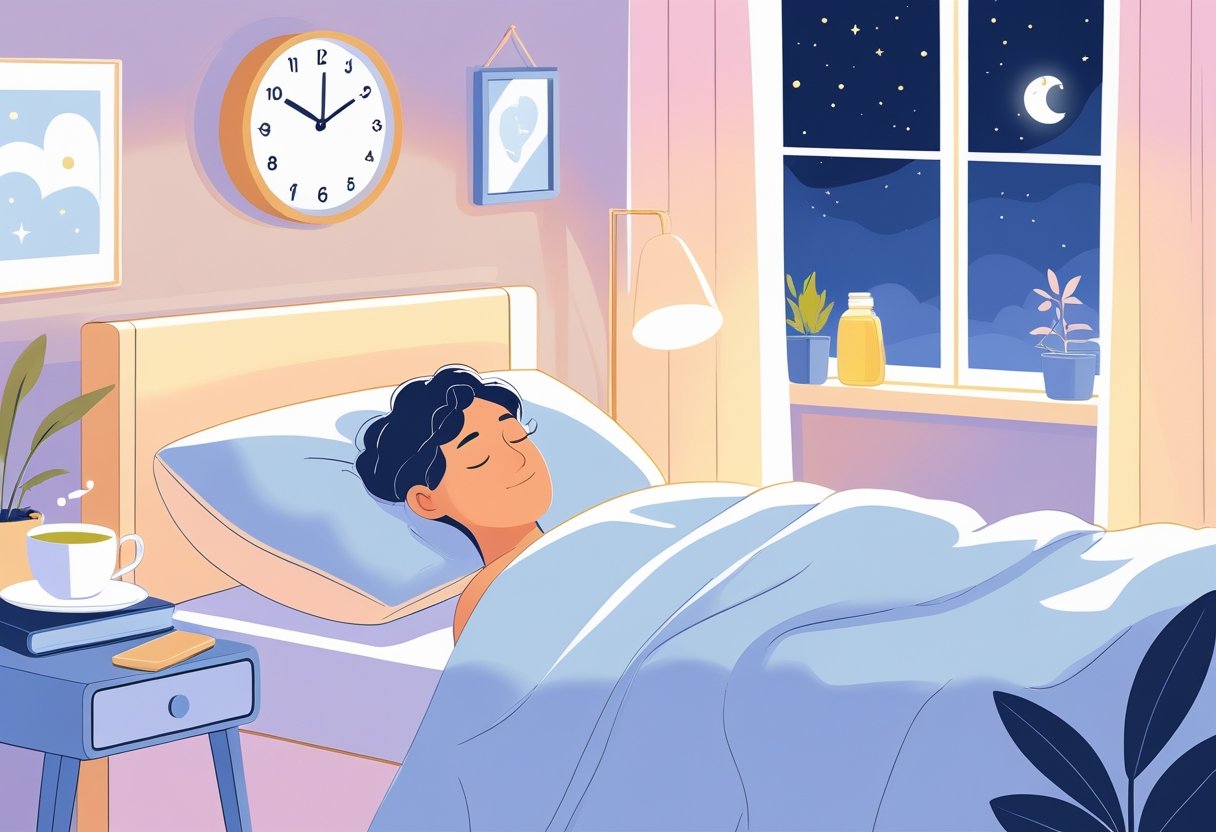
Advice for Those Who Must Sleep During the Day
Sleeping during the day can disrupt the body’s natural rhythms. To reduce problems, create a space that supports deep and restful sleep despite daylight or noise.
Optimizing Your Environment for Quality Sleep
To sleep well during the day, make the room as dark as possible. Blackout curtains or a sleep mask block sunlight and trigger the brain to release melatonin, which supports better sleep. Noise control is equally important. Use earplugs, a white noise machine, or a fan to drown out disruptive sounds such as traffic or nearby conversations.
Keep the room cool yet comfortable, ideally between 65 and 70 degrees Fahrenheit. Overly warm or stuffy environments interfere with rest. Avoid using electronics near bedtime, or silence them completely to prevent light and alerts from interrupting sleep.
By setting up these conditions, you support your health and rest even with an unusual sleep schedule.
How Your Mattress Can Support Better Sleep Habits
A mattress affects sleep quality, especially when trying to fix sleep patterns like staying up all night and sleeping all day. A good mattress relieves pressure points, so falling asleep becomes easier and comfort lasts through the night without waking up from pain or discomfort.
Spine alignment matters just as much. When a mattress supports the natural curve of the spine, it eases strain on muscles and joints. This reduces tossing and turning and leads to better overall sleep quality.
Temperature regulation also plays a crucial role. Some mattresses allow better airflow or use materials that help the body stay cool. A stable body temperature supports consistent sleep cycles and helps prevent sleep disruptions.
Here is a simple list of mattress features that support better sleep:
- Pressure relief to reduce pain
- Good spine alignment to prevent aches
- Temperature control to avoid overheating
Choosing the right mattress is essential when adjusting a sleep schedule. It supports rest during daytime hours and helps reset sleep habits more effectively.
The Brooklyn Bedding Signature Hybrid is a great match. It uses multiple foam layers and individually encased coils to deliver targeted pressure relief and excellent support for proper spinal alignment. The breathable cover allows better airflow, so the mattress stays cool throughout the night. With three firmness options, it suits a wide range of sleep preferences. It works especially great for those trying to reset their sleep schedule and get consistent rest during the day.

Frequently Asked Questions
Staying up all night and sleeping during the day can affect the body in several ways. It influences health, daily performance, hormone levels, and may cause challenges when trying to return to a normal schedule.


